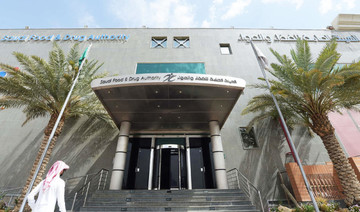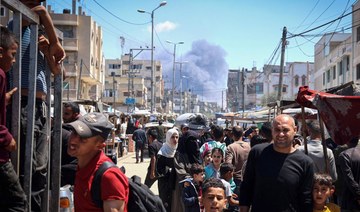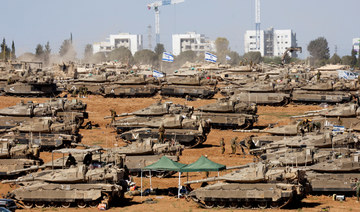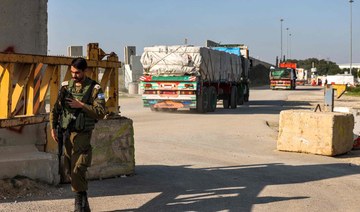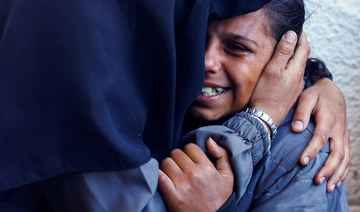CAIRO: The World Bank’s decision to invest $530 million in a project to improve Egyptian health care has been welcomed as a vital boost to a new health insurance system.
The money will go toward a five-year project being implemented by the Ministry of Health and Population and will be an integral component of Egypt’s ambitious health reforms, the World Bank said.
Some $35 million will be dedicated to a program to prevent Hepatitis C and support a new universal health care insurance system.
This mandatory insurance system follows a sharp increase in medication prices over the last two years.
Dr. Ali Hijazi, the assistant minister of health, recently revealed that Egyptians pay more than 60 percent of their own health costs.
The insurance scheme, to be introduced from 2018-2032, has proved controversial. The law will require all Egyptian residents, including employers, expatriates and casual workers to make mandatory monthly payments of between 1 and 4 percent of their income.
In addition, the family breadwinner will be responsible for paying monthly contributions for family members, including unemployed spouses and all children.
Dr. Ali Mehrez, head of the Central Administration of Medical Licenses in the Health Ministry, told Arab News that only 57 percent of Egyptians currently have medical insurance.
He said it was necessary to ensure the quality of health services while maintaining the costs were “commensurate with the public and not excessive.”
“This new health insurance law aims to expand coverage and strengthen the local health care market, which will increase the demand for health care services again,” he added.
Egypt’s health care sector is lagging behind other countries in the region, both in quality of service and the number of people receiving treatment.
The authorities are preparing to cope with increasing demand for health care services, particularly in the densely populated urban areas of Giza, Cairo and 6th of October City.
Egypt’s health care system is also under pressure due to high levels of poverty and modern lifestyle conditions such as diabetes.
Medication shortages are also a problem. In 2013, more than 600 medicines became unavailable to patients after pharmaceutical companies and the Health Ministry failed to agree on pricing.
“The solution to the health problem in Egypt lies in the rapid implementation of the comprehensive health insurance system,” said Abdel Hamid Sheikh, a member of Parliament’s Health Committee.
He said that the new system would “achieve results and deliver services to the ordinary patient, and provide support and treatment at the expense of the state to needy patients only.”
Egypt has a diverse health system that includes many public and private health care providers.
Public hospitals are affordable, but usually overcrowded and dirty. Private hospitals are expensive but provide good services.
“The adoption of the comprehensive social health insurance law is a major achievement, but the biggest achievement is that we expect it to start this month,” said Dr. Abdelhamid Abaza, a former assistant health minister. “This project is the basis of health reform in Egypt.”
World Bank aid vital boost to Egypt’s new health insurance system
World Bank aid vital boost to Egypt’s new health insurance system
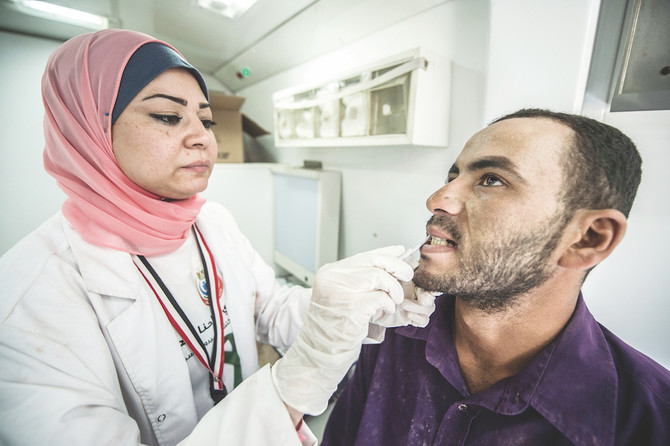
- Some $35 million will be dedicated to a program to prevent Hepatitis C
- The money will go toward a five-year project being implemented by the Ministry of Health and Population
South Gaza hospitals have only three days’ fuel left: WHO

- Despite international objections, Israel sent tanks into the overcrowded southern city of Rafah on Tuesday and seized the nearby crossing into Egypt
- “Hospitals in the south of Gaza only have three days of fuel left, which means services may soon come to a halt,” WHO chief said
GENEVA: Hospitals in the southern Gaza Strip have only three days of fuel left, the head of the World Health Organization said Wednesday, due to closed border crossings.
Despite international objections, Israel sent tanks into the overcrowded southern city of Rafah on Tuesday and seized the nearby crossing into Egypt that is the main conduit for aid into the besieged Palestinian territory.
“The closure of the border crossing continues to prevent the UN from bringing fuel. Without fuel all humanitarian operations will stop. Border closures are also impeding delivery of humanitarian aid into Gaza,” WHO Director General Tedros Adhanom Ghebreyesus said on X, formerly Twitter.
“Hospitals in the south of Gaza only have three days of fuel left, which means services may soon come to a halt.”
Tedros said Al-Najjar, one of the three hospitals in Rafah, was no longer functioning due to the ongoing hostilities in the vicinity and the military operation in Rafah.
“At a time when fragile humanitarian operations urgently require expansion, the Rafah military operation is further limiting our ability to reach thousands of people who have been living in dire conditions without adequate food, sanitation, health services and security,” he said.
“This must stop now.”
The Geneva-based WHO is the UN’s health agency.
Israel bombarded Rafah on Wednesday as talks resumed in Cairo aimed at agreeing the terms of a truce in the seven-month war.
Gaza’s bloodiest-ever war began following Hamas’s unprecedented October 7 attack on Israel that resulted in the deaths of more than 1,170 people, mostly civilians, according to an AFP tally of Israeli official figures.
Vowing to destroy Hamas, Israel has conducted a retaliatory offensive that has killed more than 34,800 people in Gaza, mostly women and children, according to the Hamas-run territory’s health ministry.
Egypt police probe murder of Israeli-Canadian businessman
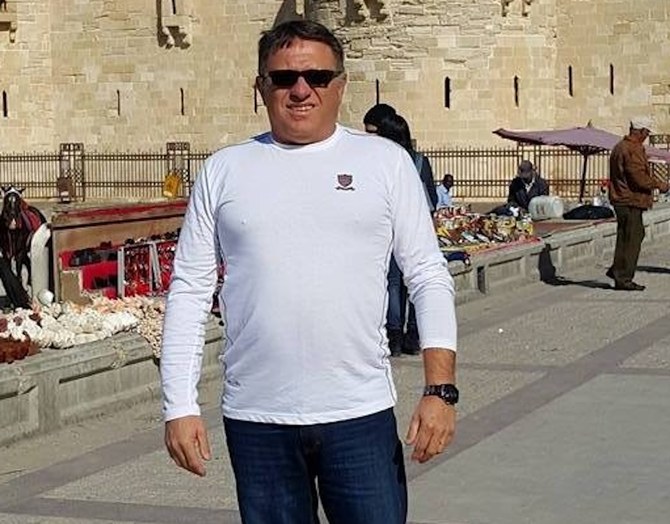
- Security sources made no link between the shooting and the dead man’s ethnic background
CAIRO: Egypt’s interior ministry said it had launched an investigation Wednesday after an Israeli-Canadian businessman was shot dead in the coastal city of Alexandria.
A police statement said the man, “a permanent resident of the country” was shot dead on Tuesday.
The Israeli foreign ministry said the murdered man was a businessman with dual Canadian-Israeli citizenship.
“He had a business in Egypt. The Israeli embassy in Cairo is in contact with the Egyptian authorities, who are investigating the circumstances of the case,” the ministry said.
Attacks on Israelis in Egypt are rare but not unprecedented.
On October 8, the day after Hamas attacked Israel triggering war in Gaza, an Egyptian policeman shot dead two Israeli tourists and their Egyptian guide.
Following their deaths, Israeli authorities advised its nationals in Egypt to leave “as soon as possible.”
Egypt was the first Arab country to sign a peace treaty with Israel but relations between the two peoples have never been warm.
The Egyptian government has often acted as mediator in flare-ups in the Israeli-Palestinian conflict that have threatened to stir up passions on the street.
Israel pounds Gaza as truce talks resume in Cairo
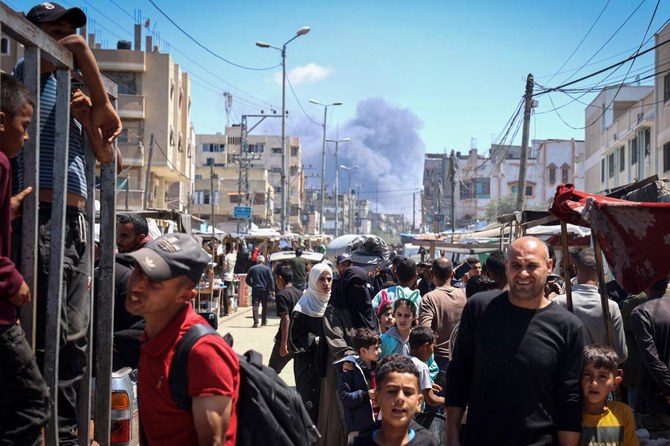
- AlQahera News: ‘Truce negotiations have resumed in Cairo today with all sides present’
- Moscow so far sees no prospect for a peace settlement in Gaza or the wider Middle East
RAFAH, Palestinian Territories: Israel bombarded the overcrowded Gaza city of Rafah, where it has launched a ground incursion, as talks resumed Wednesday in Cairo aimed at agreeing the terms of a truce in the seven-month war.
Despite international objections, Israel sent tanks into Rafah on Tuesday and seized the nearby crossing into Egypt that is the main conduit for aid into the besieged Palestinian territory.
The White House condemned the interruption to humanitarian deliveries, with a senior US official later revealing Washington had paused a shipment of bombs last week after Israel failed to address US concerns over its Rafah plans.
The Israeli military said hours later it was reopening another major aid crossing into Gaza, Kerem Shalom, as well as the Erez crossing.
But the UN agency for Palestinian refugees, UNRWA, said the Kerem Shalom crossing — which Israel shut after a rocket attack killed four soldiers on Sunday — remained closed.
It came after a night of heavy Israeli strikes and shelling across Gaza. AFPTV footage showed Palestinians scrambling in the dark to pull survivors, bloodied and caked in dust, out from under the rubble of a Rafah building.
Russia said on Wednesday that the war in Gaza was escalating due to Israel’s incursion into Rafah and that Moscow so far saw no prospect for a peace settlement in Gaza or the wider Middle East.
“An additional destabilizing factor, including for the entire region, was the launch of an Israeli military ground operation in Rafah,” Russian Foreign Ministry Spokeswoman Maria Zakharova told reporters.
“About one and a half million Palestinian civilians are concentrated there. In this regard, we demand strict compliance with the provisions of international humanitarian law.”
Speaking more broadly about efforts to find a lasting settlement in the Middle East, Zakharova said: “I would like to call it a settlement, but, alas, it is far from a settlement.”
“There are no prospects for resolving the situation in the Gaza Strip. On the contrary, the situation in the conflict zone is escalating daily.”
“We are living in Rafah in extreme fear and endless anxiety as the occupation army keeps firing artillery shells indiscriminately,” said Muhanad Ahmad Qishta, 29.
“Rafah is a witnessing a very large displacement, as places the Israeli army claims to be safe are also being bombed,” he said.
The Gaza war was sparked by Hamas’s unprecedented October 7 attack on Israel, which resulted in the deaths of more than 1,170 people, mostly civilians, according to an AFP tally of Israeli official figures.
Israel in response vowed to crush Hamas and launched a military offensive that has killed at least 34,789 people in Gaza, mostly women and children, according to the Hamas-run territory’s health ministry.
Militants also took around 250 people hostage, of whom Israel estimates 128 remain in Gaza, including 36 who are believed to be dead.
Talks aimed at agreeing a ceasefire resumed in Cairo on Wednesday “in the presence of all parties,” Egyptian media reported.
A senior Hamas official said the latest round of negotiations would be “decisive.”
“The resistance insists on the rightful demands of its people and will not give up any of our people’s rights,” he said on condition of anonymity because he was not authorized to speak publicly on the negotiations.
The official had previously warned it would be Israel’s “last chance” to free the scores of hostages still in militants’ hands.
Mediators have failed to broker a new truce since a week-long ceasefire in November saw 105 hostages freed, the Israelis among them in exchange for Palestinian prisoners held by Israel.
Mediator Qatar urges international community to prevent Rafah ‘genocide’
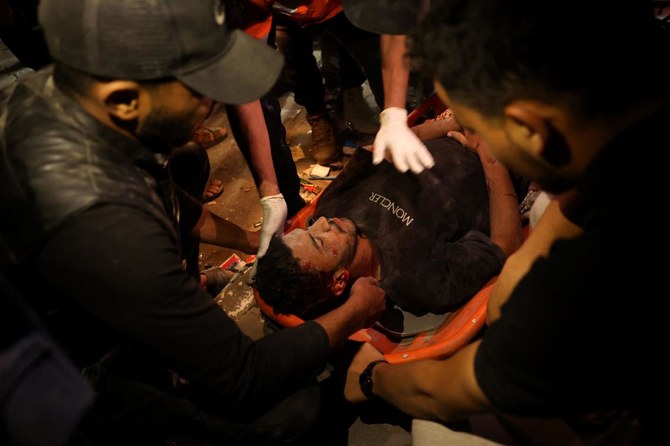
- Israel struck targets in the Gaza Strip on Wednesday after seizing the main border crossing with Egypt
- African Union condemns the Israeli military’s moves into southern Gaza’s Rafah
DOHA: Qatar called on the international community on Wednesday to prevent a “genocide” in Rafah following Israel’s seizure of the Gaza city’s crossing with Egypt and threats of a wider assault.
In a statement the Gulf state, which has been mediating between Israel and militant group Hamas, appealed “for urgent international action to prevent the city from being invaded and a crime of genocide being committed.”
Israel struck targets in the Gaza Strip on Wednesday after seizing the main border crossing with Egypt. Israel has vowed for weeks to launch a ground incursion into Rafah, despite a clamour of international objection.
The attacks on the southern city, which is packed with displaced civilians, came as negotiators and mediators met in Cairo to try to hammer out a hostage-release and truce deal in the seven-month war.
Qatar, which has hosted Hamas’s political office in Doha since 2012, has been engaged — along with Egypt and the United States — in months of behind-the-scenes mediation between Israel and the Palestinian group.
The African Union condemned Wednesday the Israeli military’s moves into southern Gaza’s Rafah, calling for the international community to stop “this deadly escalation” of the war.
AU Commission chief Moussa Faki Mahamat “firmly condemns the extension of this war to the Rafah crossing,” said a statement after Israeli tanks captured the key corridor for humanitarian aid into the besieged Palestinian territory.
Faki “expresses his extreme concern at the war undertaken by Israel in Gaza which results, at every moment, in massive deaths and systematic destruction of the conditions of human life,” the statement said.
“He calls on the entire international community to effectively coordinate collective action to stop this deadly escalation.”
Israel says it has reopened Kerem Shalom border crossing for Gaza aid
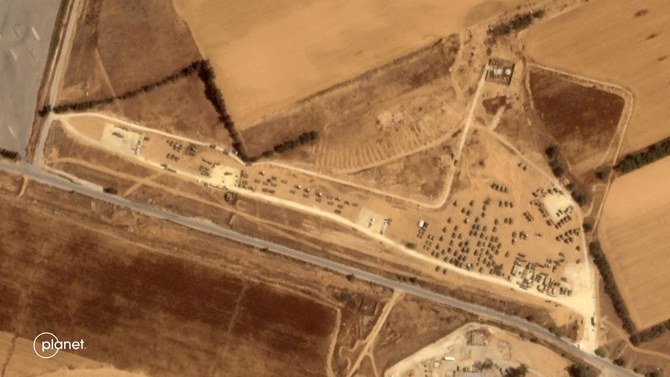
- Erez border crossing between Israel and northern Gaza is also open for aid deliveries into the Palestinian territory
JERUSALEM: Israel said it reopened the Kerem Shalom border crossing to humanitarian aid for Gaza Wednesday, four days after closing it in response to a rocket attack that killed four soldiers.
“Trucks from Egypt carrying humanitarian aid, including food, water, shelter equipment, medicine and medical equipment donated by the international community are already arriving at the crossing,” the army said in a joint statement with COGAT, the defense ministry body that oversees Palestinian civil affairs.
The supplies will be transferred to the Gaza side of the crossing after undergoing inspection, it added.
The statement said the Erez border crossing between Israel and northern Gaza is also open for aid deliveries into the Palestinian territory.
The Kerem Shalom crossing was closed after a Hamas rocket attack killed four soldiers and wounded more than a dozen on Sunday.
On Tuesday, Israeli troops seized control of the Palestinian side of the Rafah crossing between Gaza and Egypt after launching an incursion into the eastern sector of the city.
The United Nations and Israel’s staunchest ally the United States both condemned the closure of the two crossings which are a lifeline for civilians facing looming famine.




